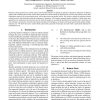Free Online Productivity Tools
i2Speak
i2Symbol
i2OCR
iTex2Img
iWeb2Print
iWeb2Shot
i2Type
iPdf2Split
iPdf2Merge
i2Bopomofo
i2Arabic
i2Style
i2Image
i2PDF
iLatex2Rtf
Sci2ools
LREC
2010
2010
Speaker Attribution in Cabinet Protocols
Historical cabinet protocols are a useful resource which enable historians to identify the opinions expressed by politicians on different subjects and at different points of time. While cabinet protocols are often available in digitized form, so far the only method to access their information content is by keyword-based search, which often returns sub-optimal results. We present a method for enriching German cabinet protocols with information about the originators of statements. This requires automatic speaker attribution. Unlike many other approaches, our method can also deal with cases in which the speaker is not explicitly identified in the sentence itself. Such cases are very common in our domain. To avoid costly manual annotation of training data, we design a rule-based system which exploits morphosyntactic cues. We show that such a system obtains good results, especially with respect to recall which is particularly important for information access.
Cabinet Protocols | Education | German Cabinet Protocols | Historical Cabinet Protocols | LREC 2010 |
| Added | 29 Oct 2010 |
| Updated | 29 Oct 2010 |
| Type | Conference |
| Year | 2010 |
| Where | LREC |
| Authors | Josef Ruppenhofer, Caroline Sporleder, Fabian Shirokov |
Comments (0)

